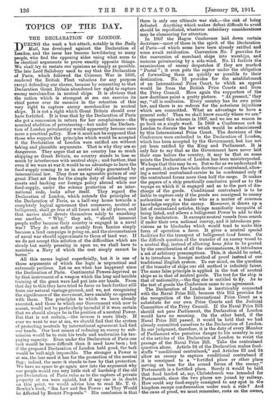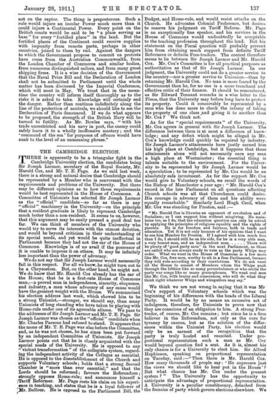TOPICS OF TIIE DAY
THE DECLARATION OF LONDON.
DURING the week a hot attack, notably in the Daily Mail, has developed against the Declaration of London, and the issue has become bewildering to many people, who find the opposing sides using what seem to be identical arguments to prove exactly opposite things. We shall try to restate our opinions as simply as possible. The late Lord Salisbury used to say that the Declaration of Paris, which followed the Crimean War in 1856, rendered the British Fleet valueless for any purpose except defending our shores, because by consenting to that Declaration Great Britain abandoned her right to capture enemy merchandise in neutral ships. It is obvious that the nation which is strongest at sea can exercise its chief power over its enemies in the retention of this very right to capture enemy merchandise in neutral ships. It is not a right which Great Britain should ever have forfeited. It is true that by the Declaration of Paris she got a concession in return for her complaisance—the nominal abolition of privateering—but under the Declara- tion of London privateering would apparently become once more a practical policy. Now it must not be supposed that those who support the principles which would, be accepted if the Declaration of London were ratified are without taking and plausible arguments. That is why they are so dangerous. They argue that as no country has so much shipping as Great Britain, no country stands to lose so much by interference with neutral ships ; and further, that even if we were at war it would be an advantage to have the food-supply coming to us in neutral ships guaranteed by international law. They draw an agreeable picture of our great Fleet set free for the simple duty of defending our coasts and backing our foreign policy abroad while our food-supply, under the solemn protection of an inter- national code, looks after itself. They regard the Declaration of London, which extends the principles of the Declaration of Paris, as a half-way house towards a completely logical agreement that commerce, neutral or belligerent, shall go free at all times and in all places, and that navies shall devote themselves solely to smashing one another. "Why," they ask, "should innocent people suffer because their country is engaged in a naval war? They do not suffer acutely from famine simply because a land campaign is going on, and the circumstances of naval war should approximate to those of land war. If we do not accept this solution of the difficulties which are slowly but surely pressing in upon us, we shall have to maintain a Navy of which the cost simply cannot be borne."
All this seems logical superficially, bat it is one of those arguments of which the logic is unpractical and extremely perilous. Let WI see what has happened since the Declaration of Paris. Continental Powers deprived us by that instrument of a weapon which the long and terrible training of the great wars had put into our hands. From that day to this they have tried to force us back further still from our natural vantage-ground, and we, not recognising the significance of the movement, have amiably co-operated with them. The principles to which we have already assented, and those to which our Government wish now to assent, would not be particularly harmful if it were certain that we should always be in the position of a neutral Power. But that is not certain,—the reverse is more likely. If ever we went to war at sea, we should find that the system of protecting neutrals by international agreement had tied our hands. Our best means of reducing an enemy to sub- mission would be to ruin his trade and undermine his tax- paying capacity. Even under the Declaration of Paris our task would be more difficult than it need have been ; but if the proposed Declaration of London held good, the task would be well-nigh impossible. The stronger a Power is at sea, the less need it has for the protection of the neutral flag ; indeed, the more it stands to lose by that protection. We have no space to go again now into the argument why our people would run very little risk of hardship if the old pre-Declaration of Paris rules as to the capture of private property at sea were upheld, but if any one is in doubt on this point, we would advise him to read Mr. T. G. Bowles's book, "Sea Law and Sea Power : as They Would be Affected by Recent Proposals." His conclusion is that there is only one ultimate war risk,—the risk of being defeated. Anything which makes defeat difficult to avoid should be repudiated, whatever subsidiary considerations may be clamouring for attention.
In 1907 the Hague Conference laid down certain doctrines—most of them in the spirit of the Declaration of Paris—of which some have been already ratified and some await ratification. Convention No. 7 provides for the conversion of merchant ships into warships, and restores privateering by a side-wind. No. 11 forbids the examination of enemy despatches if they are marked " Postal " ; it even puts the captor under the obligation of forwarding them as quickly as possible to their destination. No. 12 provides for the establishment of an International Prize Court, to which an appeal would lie from the British Prize Courts and from the Privy Council. Here again the supporters of the new doctrines paint a pretty picture. "At present," they say, "all is confusion. Every country has its own prize law, and there is no redress for the notorious injustices which are committed. What an advantage to have a general code ! Then we shall know exactly where we are." We opposed this scheme in 1907, and we see no reason to go back on a single word. In 1908 a Conference met in London to discuss the law which would be administered by this International Prize Court. The decisions of the Conference were embodied in the Declaration of London, which has been accepted by the Government, but has not yet been ratified by the King and Parliament It is only fair to say that as the Government have never laid their case before the country, it may be that on some points the Declaration of London has been misinterpreted. We hope that this may be so. But so far as we understand it at present, it alters the whole doctrine of contraband, allow- ing a neutral contraband-carrier to be condemned only if the contraband forms more than half the cargo. It makes the papers of a ship practically conclusive proof as to the voyage on which it is engaged and as to the port of dis- charge of the goods. Conditional contraband is to be liable to capture only if the goods are consigned to enemy authorities or to a trader who as a matter of common knowledge supplies the enemy. Moreover, it draws up a list of contraband articles, things manifestly incapable of being listed, and allows a belligerent Power to add to this list by declaration. It exempts neutral vessels from search if under their own national convoy, and it introduces pro- visions as to blockades which would tend to make this form of operation a farce. It gives a neutral special facilities for the transport of belligerent land forces. On the difficult question of the transfer of an enemy vessel to a neutral flag, instead of allowing bona fides to be proved by the consideration of all the circumstances, it introduces a set of arbitrary presumptions. This, it should be noted, is to introduce a foreign method of proof instead of our traditional English system. To our mind, on the question of the transfer of ships our old method is infinitely fairer. The same false principle is applied in the test of neutral ships as in that of neutral goods. The test for the ship is that of nationality,—the flag she is entitled to fly. As to the test of goods the Conference came to no agreement. The Declaration of London is inextricably connected with the Naval Prize Bill, because this Bill provides for the recognition of the International Prize Court as a substitute for our own Prize Courts and the Judicial Committee of the Privy Council. If the Naval Prize Bill should not pass Parliament, the Declaration of London would have no meaning. On the other hand, if the Naval Prize Bill passed, it would be held that we had already committed ourselves to the Declaration of London. In our judgment, therefore, it is the duty of every Member of Parliament who perceives danger to his country in any of the articles of the Declaration of London to resist the passage of the Naval Prize Bill. Take the contraband question alone. Article 24 of the Declaration makes food- stuffs "conditional contraband," and Articles 33 and 34 allow an enemy to capture conditional contraband if it is consigned to a "fortified place or other place serving as base for the armed forces of the enemy." Portsmouth is a fortified. place. Surely it would be held that food landed at, say, Christchurch was intended for Portsmouth, since the two places are joined by railway. How could any food-supply consigned to any spot in the kingdom escape condemnation under such a rule ? And the onus of proof, we must remember, rests on the owner, not on the captor. The thing is preposterous. Such a rule would injure an insular Power much more than it could injure a Continental Power. Every point on the British coasts would be said to be "a place serving as base" for every "fortified place" in the land. But the fortified places of the Continent could receive supplies with impunity from remote parts, perhaps in other countries, joined to them by rail. Against the dangers to which the Government propose to commit us protests have come from the Australian Commonwealth, from the London Chamber of Commerce and similar bodies, from numerous distinguished sailors, and. from many great shipping firms. It is a wise decision of the Government that the Naval Prize Bill and the Declaration of London shall not be submitted to Parliament until the whole matter has been discussed by the Imperial Conference, which will meet in May. We trust that in the mean- time the country will inform itself thoroughly as to the risks it is asked to take. Knowledge will certainly end the danger. Rather than continue indefinitely along the line of the protection of neutrals, we should like to see the Declaration of Paris denounced. If we do what appears to be proposed, the strength of the British Navy will be turned to futility. As Mr. Bowles says, " with his trade unrestricted and his navy in port, the enemy could safely leave it to a wholly inoffensive mastery ; and the 'command of the sea' for purposes of offence would have sunk to the level of an unmeaning phrase."























































 Previous page
Previous page